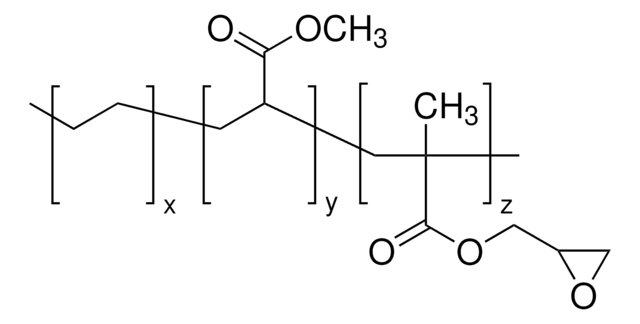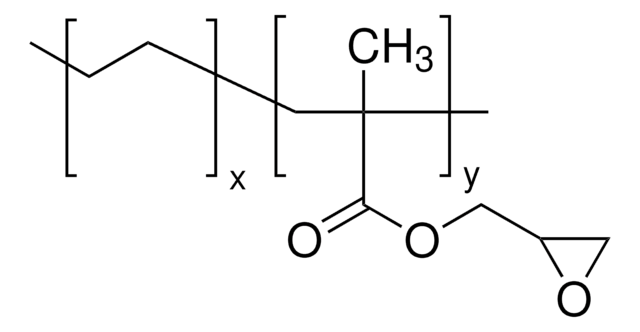すべての画像(2)
About This Item
化学式:
(CH2CH2)x[CH2CH(CO2H)]y
CAS番号:
MDL番号:
UNSPSCコード:
12162002
PubChem Substance ID:
NACRES:
NA.23
おすすめの製品
詳細
drop point 105 °C Mettler
品質水準
形状
beads
組成
acrylic acid, 5 wt. %
硬度
≤2.5 dmm (ASTM D 5, 25 °C)
粘度
575 cP(145 °C, Brookfield)(lit.)
酸性度指数
37‑44 mg KOH/g
転移温度
Tm 99-101 °C
密度
0.93 g/mL at 25 °C
SMILES記法
C=C.OC(=O)C=C
InChI
1S/C3H4O2.C2H4/c1-2-3(4)5;1-2/h2H,1H2,(H,4,5);1-2H2
InChI Key
QHZOMAXECYYXGP-UHFFFAOYSA-N
類似した製品をお探しですか? 訪問 製品比較ガイド
アプリケーション
加工性および性能向上用添加剤です。 PETの結晶化を促進します。. プラスチック内における添加剤の分散を助けます。
特徴および利点
可逆的イオン性クラスタ-(架橋)を生成します。 多種類の基質に対する接着を促進し、親のアクリル酸コポリマ-よりも強く、より耐薬品性があり、より透明です。
シグナルワード
Danger
危険有害性情報
危険有害性の分類
Aquatic Chronic 3 - Eye Dam. 1 - Skin Corr. 1A - STOT SE 3
ターゲットの組織
Respiratory system
保管分類コード
8A - Combustible corrosive hazardous materials
WGK
WGK 3
引火点(°F)
Not applicable
引火点(℃)
Not applicable
適用法令
試験研究用途を考慮した関連法令を主に挙げております。化学物質以外については、一部の情報のみ提供しています。 製品を安全かつ合法的に使用することは、使用者の義務です。最新情報により修正される場合があります。WEBの反映には時間を要することがあるため、適宜SDSをご参照ください。
PRTR
第一種指定化学物質
労働安全衛生法名称等を表示すべき危険物及び有害物
名称等を表示すべき危険物及び有害物
労働安全衛生法名称等を通知すべき危険物及び有害物
名称等を通知すべき危険物及び有害物
Jan Code
426717-VAR:
426717-BULK:
426717-1KG:
426717-250G:
Newton C Fawcett et al.
Langmuir : the ACS journal of surfaces and colloids, 20(16), 6651-6657 (2004-07-28)
Yoshimoto et al. [Anal. Chem. 2002, 74, 4306-4309] reported that a quartz crystal microbalance or QCM changed its response to sucrose solutions according to its angle of immersion. The effect was tentatively attributed to gravity-caused stress on the viscous interface
Siri Schauff et al.
Analytical chemistry, 79(21), 8323-8326 (2007-10-09)
The separation process in reversed-phase high-performance liquid chromatography employing C18 phases is mainly due to hydrophobic interactions. The separation of tocopherol isomers, exhibited by the C30 phases, however, is additionally driven by shape selectivity. This phenomenon is investigated by suspended-state
Christoph Meyer et al.
Analytical and bioanalytical chemistry, 382(3), 679-690 (2004-08-04)
Three poly(ethylene-co-acrylic) acid copolymers (-CH(2)CH(2)-)(x)[CH(2)CH(CO(2)H)-](y) with different chain lengths and mass fractions of acrylic acid were covalently immobilized as stationary phases on silica via two variants of spacer molecules (3-aminopropyltriethoxysilane and 3-glycidoxypropyltrimethoxysilane). Different mobilities of the alkyl chains in the
Ning Luo et al.
Colloids and surfaces. B, Biointerfaces, 50(2), 89-96 (2006-06-06)
Poly(ethylene-co-acrylic acid) (EAA) films were reacted with glycine, 12-aminododecanoic acid, aspartic acid, 5-aminoisophthalic acid, ethanolamine, diethylamine, dimethylamine, N-isopropylamine, and dimethylaminoethyleneamine to prepare EAA films with negatively charged, non-charged, hydrophilic, and hydrophobic functionalities. Attenuated total reflectance Fourier transform infrared spectroscopy, differential
Xiaodi Su et al.
Journal of colloid and interface science, 287(1), 35-42 (2005-05-26)
In this study, we use the quartz crystal microbalance with dissipation monitoring (QCM-D) to study the immobilization of the enzyme horseradish peroxidase (HRP) on poly(ethylene-co-acrylic acid) (PEAA) films. The surface polarity of spin-coated PEAA films was varied by heat treatments
ライフサイエンス、有機合成、材料科学、クロマトグラフィー、分析など、あらゆる分野の研究に経験のあるメンバーがおります。.
製品に関するお問い合わせはこちら(テクニカルサービス)








